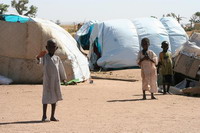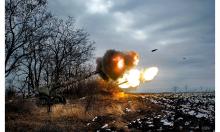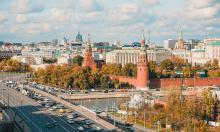EU nations not to meet UN's calls for helicopters for peacekeeping force in Darfur
European Union nations have a lot of own problems to pay attention to U.N.'s urgent calls for helicopters for a peacekeeping force in Darfur.

More than 200,000 people have been killed, and 2.5 million have been uprooted, in Sudan's western Darfur region since a rebellion broke out in 2003. And many European governments have said they support deploying a peacekeeping force in Darfur.
But when it comes to Sudan, verbal support is one thing; helicopters are another matter entirely.
"There's something like 12,000 military helicopters in Europe, so it's bizarre that not one has been found available so far to commit to this force," said Thomas Cargill, Africa program manager at Chatham House, an international affairs think tank in London.
And European countries, Cargill said, risk undermining their credibility "if they commit themselves to resolving a crisis but then can't commit themselves to providing the necessary hardware."
A U.N.-African Union peacekeeping force of 26,000 troops is scheduled to officially take over from an AU force in the Darfur region in three weeks. But U.N. Secretary General Ban Ki-moon said Thursday that 24 aircraft - 18 transport helicopters and six light tactical helicopters - are essential.
Otherwise, he said, the force will not be able to protect its own soldiers, let alone the area's civilians.
Sudan also has put up road blocks. The U.N. Security Council agreed that the force should be predominantly African - at Sudan's insistence. Khartoum has refused to approve non-African units from Thailand, Nepal and the Nordic countries, even though 90 percent of the ground troops and 75 percent of the proposed force are from Africa.
On helicopters, Ban said he had approached every country that could possible contribute a helicopter - "to no avail."
The reason, said John Kotsopoulos of the European Policy Center, a Brussels-based think tank, is that the Darfur mission is taking a back seat to other priorities.
"The rhetoric does not often match the practice; once again we are seeing this here," Kotsopoulos said.
Ban sent two high-level envoys to pressure leaders attending an EU-Africa summit in Lisbon, Portugal, this weekend. And European military officials and diplomats have continued to insist this week that they are trying to find some helicopters to contribute.
But there has been no movement on the issue this week, the officials and diplomats said on condition of anonymity due to the sensitivity of negotiations.
Those trying to put it together say the mission is at risk.
"We need helicopters," said Brig. Gen. Solomon Giwa-Amu, a spokesman for the Nigerian Army, which now has 3,500 troops, the largest African contingent, in the current force and plans to send more to the joint force. "If we have six helicopters that will be of great help for the troops because of the terrain."
Publicly, European government ministers have been keen to stress they are doing everything they can to get the Darfur mission off the ground, along with a separate, 4,000-strong European Union peacekeeping mission in Chad and Central African Republic, which border Sudan.
But officials in many European capitals said Friday they cannot meet the U.N. request. And the deadlock over Darfur came as NATO foreign ministers in Brussels pledged this week to increase the mission in Afghanistan.
Poland said it would soon send four transport helicopters and four attack helicopters - similar to those the U.N. says are vital in Sudan - to Afghanistan, not Darfur.
"These helicopters were long ago tabbed for the Afghanistan mission," Foreign Ministry spokesman Piotr Paszkowski explained Friday. "We aren't particularly rich in helicopters."
Germany, too, will not increase its commitment to the Darfur mission because its military is stretched elsewhere, said Defense Ministry spokesman Thomas Raabe.
"That's just the way it is," Raabe said. "We have no capacity for this concrete mission."
The problem, he said, is that Germany has the third-largest contingent in Afghanistan and is the largest contributor of troops to the breakaway Serbian province of Kosovo.
Britain offered a similar explanation earlier in the week.
"I've been working the phones hard to try and get helicopters from other governments," Mark Malloch Brown, Britain's Africa minister, told British Broadcasting Corp. on Wednesday. But Britain is unable to contribute its own military helicopters because their reserves are deployed in Afghanistan, he said.
Both countries say they are contributing to the Darfur mission. Germany has sent two officers and provided troop transportation. Britain has given 75 million pounds (104.1 million EUR, US$151.5 million) to help fund the operation.
Subscribe to Pravda.Ru Telegram channel, Facebook, RSS!




